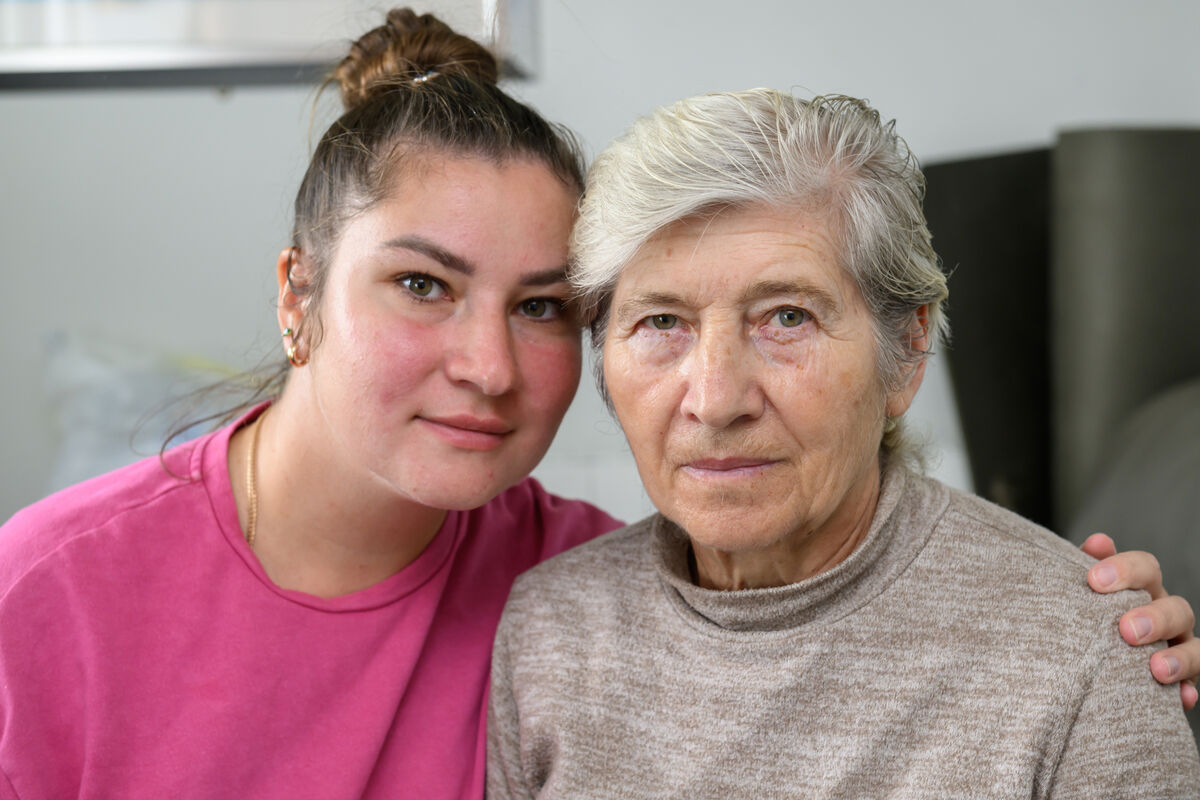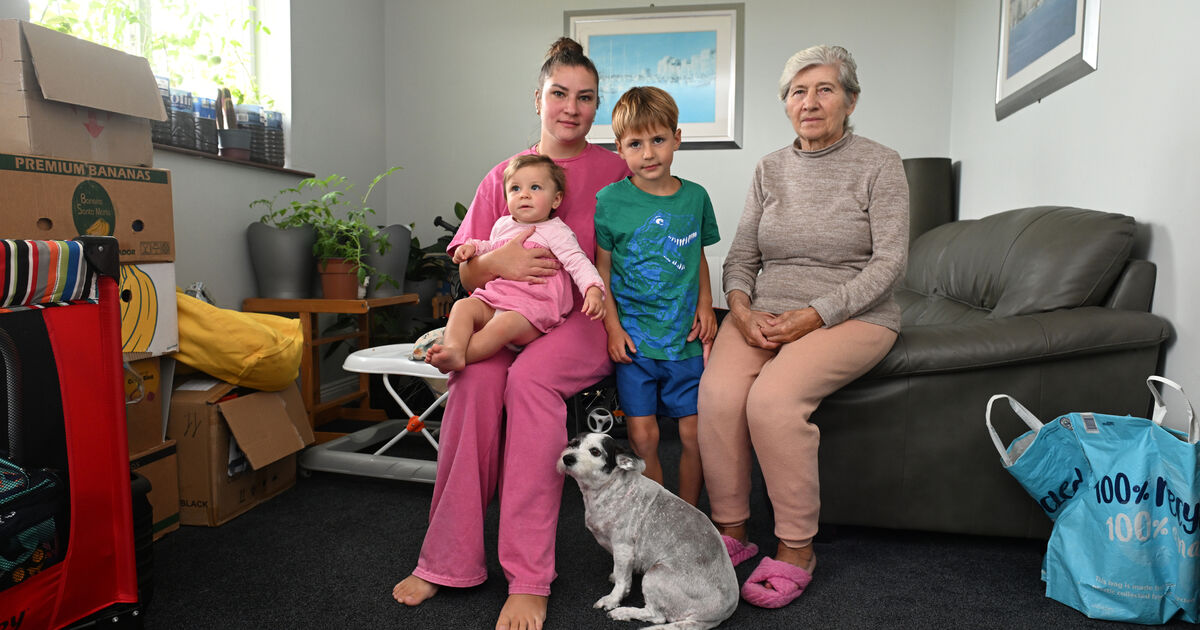Vera Arksonova spends every waking hour consumed by fear that someone is coming to hurt her.
She carries around as many possessions as she can in the belief that she is being watched and will soon be robbed of everything. The 72-year-old resident of the Quality Hotel in Youghal knows that something is coming.
The fact that she and other Ukrainian families will be forced to leave their homes on July 31 has only served to heighten her confusion.
It was initially believed that the grandmother was suffering from shock when she arrived from Ukraine three years ago. Tests carried out by Irish doctors confirmed the condition was in fact dementia.
Vera is now cared for by her daughter Violetta. The 31-year-old has two children — a daughter Samira (nine months) and five-year-old son Damir — with her husband Roman.
Violetta explains that Roman also has a litany of health challenges following concussions sustained during his time on the frontline of the war with Russia. A brain injury he experienced during childhood had been further compounded by battle wounds.
 Violeta Pratsovyta (left) with her mother Vera Aksonova. Picture: Dan Linehan
Violeta Pratsovyta (left) with her mother Vera Aksonova. Picture: Dan Linehan
Hundreds of Ukrainian residents of the Youghal hotel were first told they had to vacate six months ago via a letter from the Department of Integration. That announcement sent shockwaves through the seaside town, as the refugees, who had built lives in Youghal, were initially given just two weeks to prepare to leave their makeshift home.
Following a huge local campaign and a groundswell of support for the residents, many of whom had been living in the hotel since shortly after the Russian invasion of their country, the eviction date was subsequently extended to next week, July 31.
Violetta has since received news that her family is being relocated to a hotel in Waterford city. Details of the new living environment have come as a devastating blow, given that the accommodation is situated on a bustling city street.
Violetta described it as an extremely dangerous environment for her mother, as a dementia sufferer who is known to wander off at any time of day or night. Often times, she will be searching for the shops and bus stops she once frequented back home in Ukraine.
She is now pleading with the government to reconsider their choice of accommodation for the family. “This will be really dangerous for her,” Violetta said, fighting back tears.
“We have comfort here, knowing that she is safe and in an enclosed environment.
“Sometimes my mother will visit the reception of the hotel three times and ask the same questions because she doesn’t remember going there. She is known to wander off but everyone looks out for her here.
If they see her acting in a such a way that is aggressive they know it’s dementia. There are not many cars here so we know she’s not in danger. Now, we have to take her to a busy place where nobody knows her and she could easily wander into traffic.
She also reiterated the importance of routine for her mother’s health. “My mother needs access to a kitchen. This is essential for her mental health.
“Cooking, chopping, and washing dishes helps her stay connected to reality. Her doctor stated that having a kitchen is part of her therapy. Without it, she may rapidly deteriorate.”
Violetta does her utmost to reassure her mother.
“My mother believes that someone is trying to hurt her. She absolutely refuses to move and keeps saying she wants to return to Ukraine. She often talks about it and says she feels unwell.
Her appetite has also declined. She is afraid that we will leave her. Lately, my mother’s condition has worsened. She sleeps very poorly at night and often gets up and walks around.
“The doctors have prescribed her different medication to help her fall asleep, as the previous ones were no longer effective.”
Vera’s biggest fear is losing their adored dog Dana. Residents have been told they cannot bring their pets with them. Violetta, however, said they are not about to part with a member of their family.
“My husband has vowed to sleep with him in the car every night because we can’t have him inside. He has been with us since I was pregnant with my first child.
“He fled war with us so there is no way we can give him up. We don’t want him to be put to sleep.”
Oleksandra Makoviei, who is also a resident in the Youghal hotel, said that exceptions should be made for families like Violetta’s.
“I thank the government because we would never have had this opportunity without them. We were able to learn English for three years and find jobs.
“It’s okay for me because I have a healthy mother. Violetta has too much on her shoulders.
The children are used to school in the area. We help each other. Violetta has support here. It’s harder for some families than others.
Fiona Corcoran from Cork charity the Greater Chernobyl Cause, who has been lobbying on behalf of the Quality Hotel residents, reminded the government of their duties.
“This is not just a moral issue, it is a legal one. According to the Irish Human Rights and Equality Commission Act 2014, public bodies are legally required to act in accordance with the principles of equality, dignity, and non-discrimination, especially when it comes to vulnerable groups such as persons with disabilities, women, children, and war-affected families.
“We at The Greater Chernobyl Cause are steadfast in our dedication to providing support to our Ukrainian brothers and sisters during this critical period, which is of the uttermost importance. It is entirely unjust to forcibly remove Ukrainian residents from their sanctuary, particularly those who are ill and require medical care.”
She said that forcing people to part with their pets will be truly heartbreaking for families.
“The government allowed Ukrainian refugees to bring their pets from war-torn Ukraine. Now, they are forcing them to find new homes for their animals.
“Life would be incomplete without their pets. They provide essential emotional support in coping with the trauma caused by death, occupation, conflict, and the experience of becoming a refugee.
“We must also remember that our Ukrainians cannot return home because there is no safe area in war-torn Ukraine.”

